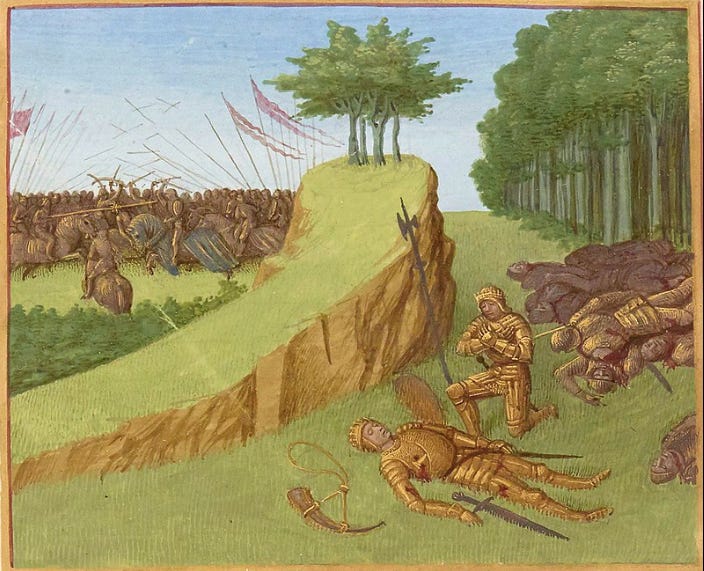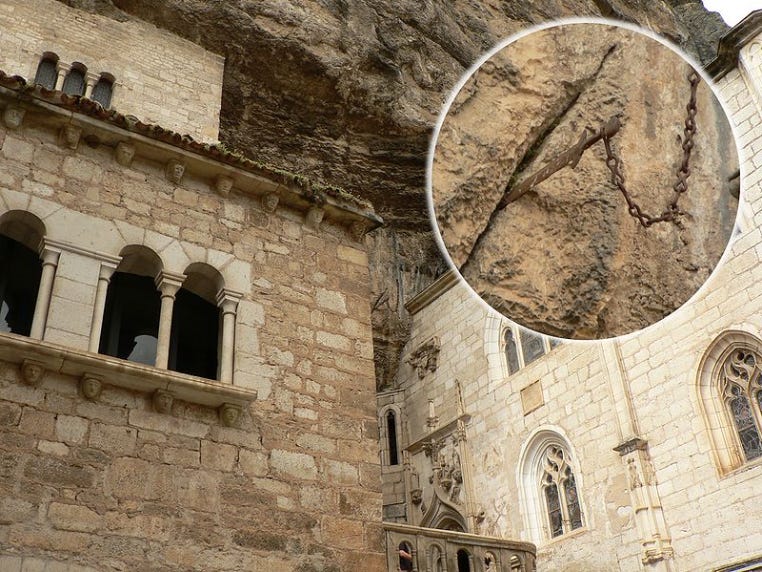Heist Watch: Mythical Sword Edition
Adam's Notes for July 11, 2024
Big thanks to everyone who contacted me last week about this story, in which a sword claimed to be Durendal has been stolen from the village of Rocamadour, where it was embedded in a cliff something like 32 feet above the ground.1 I think the story must’ve shown up in my inbox eight or nine times. The Daily Mail report in particular is very annoying, and it has, predictably, triggered something deeply pedantic in me. “French Excalibur” alone feels hugely insulting. And, as someone pointed out to me, Excalibur itself is already French.
For those who might not remember: Durendal (sometimes Durandal, Durindana if you’re reading an Italian story) is, famously, the sword of Roland, one of the principal heroes in the chansons de geste. The sword plays its biggest role in The Song of Roland, where Roland wields it in his glorious last stand. When he finally gets around to dying—not from an enemy wound, remember, but because he’s blown so hard on the horn Oliphant that his temples explode, bursting open from his effort—he manages to get up and kill one last Saracen, a guy who wanted to steal the sword from his corpse but moved in too soon. Roland attempts to break Durendal to keep it out of enemy hands, but ultimately fails to shatter it.
From the Penguin Books edition, translated by Glynn Burgess:
171 Roland feels that he has lost his sight; He rises to his feet, exerting all his strength. All the colour has drained from his face. [2300] Before him lies a dark-hued stone; On it he strikes ten blows in sorrow and bitterness. The steel grates, but does not break or become notched; ‘O, Holy Mary,’ said the count, ‘help me! O, my good sword Durendal, what a fate you have suffered! [2305] Now that I am dying, I have no more need of you; With you I have won so many battles in the field And conquered so many vast lands, Which Charles with the hoary-white beard now holds. May you never be owned by a man who flees in battle! [2310] A very fine vassal has held you for so long; There will never be such a man in blessed France.’ 172 Roland struck the sardonyx stone; The steel grates, but does not shatter or become notched. When he saw that he could not break it, [2315] He begins to lament over it to himself: ‘O, Durendal, how fair and clear and white you are! How you shimmer and sparkle in the sun! Charles was in the Vales of Maurienne, When through his angel God on high told him [2320] To give you to a captain count. Then the noble and mighty king girded it on me. With it I conquered Anjou and Brittany And with it I conquered Poitou and Maine; With it I conquered Normandy the free [2325] And with it I conquered Provence and Aquitaine And Lombardy and all Romagna. With it I conquered Bavaria and all Flanders And Burgundy and all Apulia. And Constantinople, which rendered homage to him. [2330] In Saxony his commands are obeyed. With it I conquered Scotland and Ireland And England, which became his domain; With it I have conquered so many lands and countries Which Charles with the white beard now holds. [2335] For this sword I grieve and sorrow; I should rather die than leave it in pagan hands. God, our Father, spare France this disgrace!’ 173 Roland struck upon the dark-hued stone; He hacks away more of it than I can tell. [2340] The sword grates, but neither breaks nor shatters; It rebounds towards heaven. When the count sees that he cannot break it, He lamented over it to himself very softly: ‘O, Durendal, how fair and sacred you are! [2345] In the golden hilt there are many relics: Saint Peter’s tooth and some of Saint Basil’s blood; Some hair from the head of my lord Saint Denis And part of the raiment of the Blessed Virgin. It is not right for pagans to possess you; [2350] You must be wielded by Christians. May no coward ever have you! With you I have conquered vast lands. Charles with the hoary-white beard now holds them; They have made the emperor mighty and rich.’ 174 [2355] Roland feels that death is upon him; It is moving down from his head to his heart. He ran over to a pine and beneath it And lay face down on the green grass. He places his sword and the oliphant beneath him; [2360] Towards the pagan host he turned his head, Because it was his earnest wish that Charles and all his men should say That he, the noble count, had died victoriously.
About halfway through his 1200-page book Onomastics of the “Chanson de Roland” Or: Why Gaston Paris and Joseph Bédier were both right, Gustav A. Beckmann takes a short break from investigating the origin of every single proper noun in The Song of Roland to look at why God denies Roland his final wish, to destroy Durendal. In the poem a lot of actions are described three times, which allows us to see things from different perspectives and also to play with the fairytale logic of three attempts at an action. In his first attempt to break the sword, Roland calls upon Mary, the mother of Jesus, and worries about his weapon falling into the hands of a coward (171). On his second attempt, he recalls all the lands he’s conquered with it (172). On his third and final attempt, he remembers that the sword is full of holy relics (173), at which point he and the original audience must have realized that what he was doing was blasphemous and wrong—ironically, he’s calling on Mary to destroy a weapon protected by relics associated with Mary. Realizing his error, he’s now at peace and lays down to die.
Beckmann writes that Roland’s concern for his sword is his last temptation:
Roland must free himself from all worldly concerns, including his desire to determine the fate of his beloved sword after his own death. Roland finally passes this test, but only in a feeble, human way, after he has tried and failed three times.
I think this passage is important because it clearly shows that Roland has not been a perfect hero from the very beginning, nor is he free from all human weaknesses… Where in world literature from Gilgamesh and the Iliad to the present day are heroes monolithic? Such heroes would be boring.
Beckmann also writes about the origin of the name Durendal. Some of the false etymologies he debunks include: from the Arabic Dhū’l-anḍar ‘possessing brilliance’ or Dhū’ldžandal ‘master of stone, stone-master’; a simple onomatopoeic; from the ancient name Dardanus (a mythical ancestor of the Trojans, who becomes a sorcerer in late antiquity and who himself wields a magical sword in an Egyptian magical papyrus of the 4th c.); from the Old Norse dwarves Durinn and Dáin or Dvalinn.
Durendal, according to Beckmann, comes from a given name based on something like “Durand(us) + -art.” “Durendart almost certainly appeared as a literary name in the earlier Song of Roland, which the song in its surviving form was based on, and in that older Song, the main attribute of the sword can hardly have been anything other than its hardness, which means that in principle, approaches based on dur- ‘hard’ … are correct.” There’s a whole bunch about how the common poetic words for sword and their grammatical gender were in flux, but I’ll spare you.
Still, you can’t blame people for enjoying the more fanciful etymologies. Coming up with these strange origins, narrative or etymological, is a game shared both by the poets who composed the gestes as well as academics going back to the 19th century. Boiardo and Ariosto have the sword originate with Hector in the Trojan War, and the Chanson de Aspremont features Roland’s enfance (think origin story): Roland is too young to go to war but he and some friends sneak off anyway, attempt to steal horses from some Breton soldiers, and fight with staffs made of apple wood. Roland acquires Durendal and his horse Vielantiu/Viellantif by defeating the warrior Aumon in single combat.
Back to the Daily Mail story: the sword in the cliffs of Rocamadour is obviously not the ‘real’ Durendal.
As it happens, I took an interest in the Rocamadour sword about ten years ago and emailed Notre-Dame de Rocamadour (the chapel responsible for the sword), and they confirmed that it was just an old sword placed there in the late 1800s to attract tourists. In fact, it’s not even the original sword from the 1800s. The reason it was chained 31 feet up the side of a cliff is because people kept stealing the sword and locals kept moving it higher. The current sword was just sheet metal.
That said, Rocamadour seems like a neat place. A picturesque village built in a gorge above the Dordogne. It’s about an hour away from the famous caves of Lascaux, and I believe the town has some ancient cave paintings of its own. And Rocamadour does, in fact, have a claim to literary fame, but it’s a lot more recent than The Song of Roland. In Houellebecq’s novel Submission (the one where he gets himself worked up imagining a Muslim elected to the French presidency), the author stand-in visits Rocamadour and finds that it has a very Houellebecqian atmosphere: a pilgrimage site once associated with the sacred turned into a place of consumption for tourists. He visits the shrine of the Black Virgin and finds himself communing with the past, having an almost religious experience, but one that quickly evaporates. He remembers that he’s forgotten to eat and writes the feeling off as “an attack of mystical hypoglycaemia” and as he returns to the parking lot the experience is well and truly over.
I think ultimately, there’s something similar going on with the Daily Mail’s Durendal story. We’re all yearning for something ancient and mysterious in our lives, and the story about a stolen sword scratches that itch. But forcing the facts to fit the story is only going to lead us back to the disappointment of the parking lot.

Links
I have a review of the Jean Echenoz novel Special Envoy out at Sage Cigarettes.
Orlando Whom? Or, Why Roland was not Charlemagne’s Nephew: A recent blog post from Carolingian scholar Sam Ottewill-Soulsby on the identity of the historical Roland.
I really enjoyed this post from Eric Williams on visiting the tombstones of dead writers.
An interesting essay arguing for more literary snobbery within genre fiction at Typebar Magazine.
And finally, some reporting on the horses of Sable Island.
Thanks for reading! See you next time.
Instagram | Goodreads | Letterboxd | Bluesky



At least they didn't steal the goats-milk cheese mentioned in the Wiki link!
And, since the Basques are behind Roncevalles, speaking of parking lots, why don't we have a legend of a Holy Hand Grenade of Bilbao in a parking lot or something?
You reminded me of the entire year we spent in French Literature class, in middle school, on La Chanson de Roland. I don't think I've ever been so bored in my life, although dissecting Racine's Phedre a few years later came close. Funny about Rocamadour, I thought Roland died in the Pyrenees ...